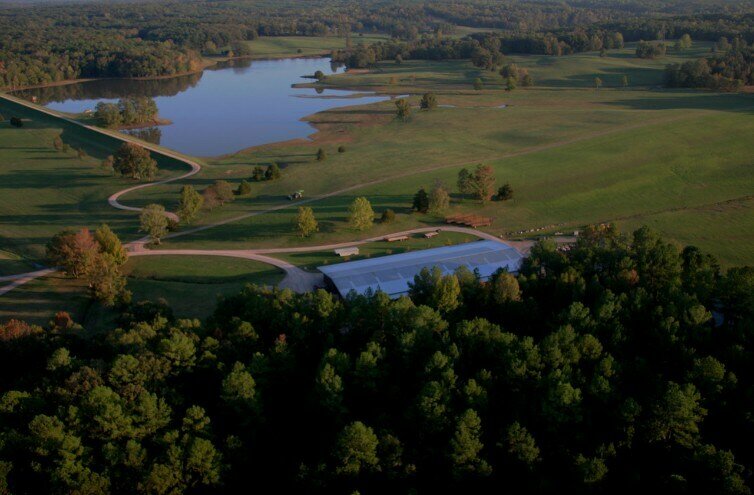Goal of carbon-free electricity becoming a reality for Ford
BlueOval City designed to protect the environment and local communities
As construction of BlueOval City progresses in Haywood County, Ford’s vision for an efficient and carbon-neutral manufacturing facility is becoming a reality. From its earliest conception, BlueOval City was designed to help minimize impact on the local environment and to protect the local community.
“We recognize the significance of farming, fishing and hunting in West Tennessee,” said Blake Newbill, senior environmental engineer, Tennessee Electric Vehicle Center. “And we understand that part of being a good neighbor is caring for the air, water and land so these important resources are preserved for our community.”
The size of the BlueOval City project required Ford to invest in a significant stream restoration project, and the UT Institute of Agriculture was prepared to meet this need through a restoration project at Lone Oaks Farm in Middleton. The agreement totaled $16.5 million, which covers the construction cost of restoring some 20,000 feet of streams on the Lone Oaks property, while also providing long-term financial sustainability for Lone Oaks’ educational programs.
The project involved many other partners, including The Tennessee Wildlife Federation and the West Tennessee River Basin Authority (WTRBA).
Ford is investing in carbon-free and renewable electricity in West Tennessee to help strengthen the local energy grid and reduce air emissions. The company’s goal is for the Tennessee Electric Vehicle Center assembly plant to use carbon-free electricity.
New technology aims to help reduce the amount of electricity needed to manufacture vehicles, including innovations that will capture and reuse heat from the site’s utility infrastructure and geothermal energy system to provide heat for the assembly plant – saving about 300 million cubic feet of natural gas typically needed each year to heat similarly sized vehicle assembly plants.
To further help protect air quality, Ford plans to install state-of-the art systems that will help limit emissions with no uncontrolled exhausts from painting operations. The air emission limits for Tennessee Electric Vehicle Center are the most stringent of any U.S. assembly plant.
“As always for Ford, we are focused on both what we build and how we build. We’ve continued to push ourselves on environmental quality, which includes conserving water, reducing waste and transitioning our company to carbon-free electricity. It’s what our customers and our neighbors expect from Ford,” Bill Ford and Jim Farley noted.
According to Ford’s website, 77 percent of its manufacturing facilities are true “zero waste to landfill” sites.
Ford leadership has a goal of complete carbon neutrality in the United States by 2050 and Europe by 2035.
The campus’ new utility system will save approximately 50 million gallons of water each year by reducing evaporation from the site’s cooling towers. Plus, the zero-waste-to-landfill Tennessee Electric Vehicle Center plans to reuse industrial water from across the site to preserve the use of fresh water in the plant for drinking water and other basic human needs.
This facility will also follow best practices Ford has implemented in its facilities around the world to reduce and reuse water. Ford has saved 199 billion gallons of water in its global manufacturing operations since 2000.
Ford was recognized in 2023 by the Carbon Disclosure Project (CDP), a leading global environmental nonprofit that holds the largest environmental database in the world, in a report highlighting current water risks and future water-related financial opportunities for companies.
The facility aims to incorporate environmental designs, safeguards and structures to carefully control materials used in the manufacturing process and to prevent them from having contact with stormwater runoff and soil. The facility will not store chemicals or other materials underground, and chemical storage structures will incorporate multi-level safeguards like back-up and secondary containment systems and sealed flooring with drainage to a dedicated wastewater collection system. Ford also intends to develop a holistic stormwater management system.
Construction at the West Tennessee Megasite continues as Ford Motor Company and SK On prepare to roll out Ford’s all-electric truck line by 2026. The six-square-mile site will house the Ford assembly plant and a companion electric-battery production and recycling facility, in addition to a TCAT and direct suppliers.






